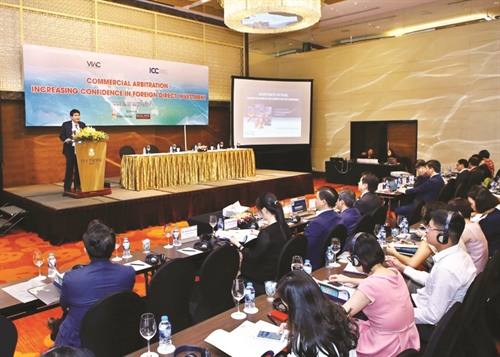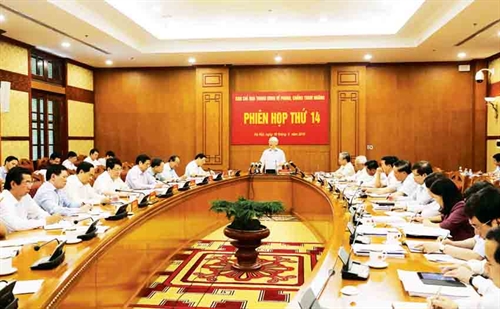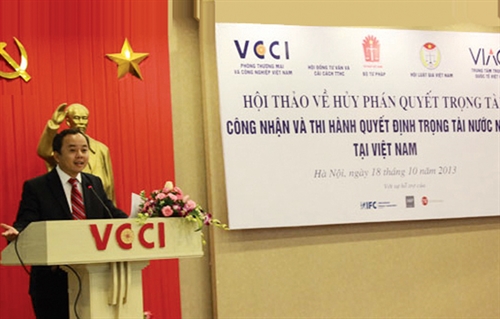Assoc. Prof. Dr. Tao Thi Quyen[1]
Ph.D Student MSc. Luong Tuan Nghia[2]
According to an estimate of the Vietnam E-commerce Association[3], the growth rate of e-commerce in Vietnam reached over 25 percent in 2017, and this rate might be maintained in the three years from 2018 to 2020. Vietnam currently has 18,173 sales websites/e-commerce applications, 785 e-commerce trading platforms, 106 websites/e-commerce applications for online promotion, and 23 websites/e-commerce applications for online auction already certified or registered for operation in accordance with the law on e-commerce. Statistics in 2018 from the E-commerce and Digital Economy Department of the Ministry of Industry and Trade (MOIT) showed that Vietnam B2C online retail revenue has reached USD 6.2 billion, accounting for 3.6 percent of total retail sales and consumer service revenues nationwide[4].
It can be seen that, together with the international integration process and the Fourth Industrial Revolution, e-commerce activities in Vietnam have been seeing the rapid and strong growth but also caused a great deal of pressure on state management work in this field.
Current situation of law-based state management of e-commerce in Vietnam
Formulation and improvement of policies and laws on e-commerce
The Prime Minister in 2001 issued Decision 81 approving the action program to implement the Party Central Committee’s Directive 58-CT/TW on stepping up the application and development of information technology serving industrialization and modernization. According to this Decision, the Ministry of Trade (now the MOIT) takes responsibility for implementing the plan on development of Vietnam’s e-commerce, focusing on e-commerce communication and training activities; creating a favorable environment for e-commerce along with promulgating adequate and synchronous legal documents related to e-commerce; supporting and applying e-commerce by state agencies; developing technical infrastructure for e-commerce on the basis of transferring technologies from abroad; resolutely and timely organizing the implementation of legal regulations related to e-commerce; and actively participating in international cooperation on e-commerce.
According to Prime Minister Decision 222 of 2005 approving the overall plan on e-commerce development during 2006-10, the State plays the role of creating a favorable legal environment, while providing public services to assist e-commerce activities, and developing e-commerce in connection with the application and development of information and communication technology.
From 2005 to 2007, many important legal documents for the development of e-commerce were issued, such as the Law on E-Transactions, Commercial Law, Law on Intellectual Property, Law on Information Technology, and Civil Code.
At the same time, the Government in 2006 issued Decree 57 on e-commerce and some other decrees on e-transactions in finance, banking, digital signatures, and digital signature certification services. Then in 2013, Decree 57 was replaced with Decree 52, which is the highest legal document on e-commerce until now. Also in 2013, the Government promulgated Decree 185 on administrative sanctions for violations of the law on e-commerce which was then amended by Decree 124 of 2015.
Under the national e-commerce development program in the 2014-20 period approved under Prime Minister Decision 689 of 2014, efforts will be concentrated on building and developing e-commerce infrastructure; conducting communication work in order to raise public awareness about e-commerce; training and developing e-commerce human resources; developing e-commerce products and solutions; giving counseling on formulation of e-commerce application plans; and implementing international cooperation on e-commerce.
In order to instruct e-commerce activities, the Minister of Industry and Trade issued some implementing documents, including Circular 47 of 2014 on management of e-commerce websites and Circular 59 of 2015 on management of e-commerce activities through applications on mobile devices (both circulars were amended under Circular 21 of 2018).
The competent state agencies also enact regulations indirectly ruling e-commerce activities, such as regulations on cyberinformation security, cyber security, electronic payment, consumer protection, and product quality, thus contributing to improvement of the e-commerce law.
In overall, the system of e-commerce regulations is being completed step by step, basically meeting the requirements of the state management of e-commerce activities in the current period.
 |
| Leaders of e-commerce businesses discuss at Vietnam Online Business Forum 2019 held on March 28 in Ho Chi Minh City__Photo: Internet |
Institutions managing e-commerce activities
The state management of e-commerce activities should involve many sectors like industry and trade, information and communications, public security, taxation, customs, market surveillance, banking and others. However, there still lack institutions managing e-commerce activities. Besides the system of state management agencies from central to local levels that manage e-commerce activities, only a few localities have established the steering committees for e-commerce activities. So far, only Hanoi has set up the e-commerce supervision team, and issued regulations on e-commerce management and development in the city. The lack of linkage in management work and delayed establishment of interdisciplinary organizations make the e-commerce management less effective.
To avoid the situation where an agency is the judge in its own case in provinces and centrally run cities, the Prime Minister promulgated Decision 34 on August 10, 2018, defining the functions, tasks, powers and organizational structure of the General Department of Market Surveillance under the MOIT. Accordingly, the local market surveillance force is transferred in status quo to the MOIT. Provincial-level Market Surveillance Branches have the function of sanctioning administrative violations in the field of e-commerce, while provincial-level Departments of Industry and Trade will perform the state management of e-commerce activities in general. This provision helps partly overcome the situation of “centralized power” of the state management institution for e-commerce activities.
Enforcement of law on e-commerce activities
The effect of implementation of law is reflected in the observance of law by all agencies, organizations and individuals. The situation of implementation of the e-commerce law in Vietnam over the past time can be generalized as follows:
It is very complicated to identify violators and violations in the cyberspace as the validity and the scope of regulation of an administrative decision are limited by the administrative boundary (territorial jurisdiction principle), hence, the violator may declare the wrong address of the office or residence to avoid inspection by the management agency or shirk the observance of sanctions.
Although the e-commerce law has included foreign entities in the subjects of regulation when they are present in Vietnam through the establishment of an e-commerce website using the Vietnamese national domain name “.vn”, but this regulation seems to be infeasible in case a foreign entity fails to strictly comply with the law on e-commerce. The competent authorities cannot issue decisions to apply laws to foreign-based traders and organizations without any physical presence in the Vietnamese territory. Even, foreign entities only register the Vietnamese national domain name “.vn” through domain name registrars; in the meantime, they aim to serve Vietnamese while all activities of their e-commerce websites are carried out overseas and their databases are located at overseas servers. Therefore, it is impossible to apply administrative sanctions such as fine or deprivation of the right to use the “.vn” domain name currently in use to maintain e-commerce websites.
E-commerce development in Vietnam in particular and in the world in general takes place rapidly together with scientific, technological and socio-economic development. However, the law on e-commerce has not yet regulated new forms and models of e-commerce and e-transaction relations and acts. Furthermore, such law does not keep up with the practical development of e-commerce activities, making the implementation of the e-commerce legislation not effective.
The law on e-commerce has neither gained the trust of buyers nor “deterred” sellers. The report of the Department of E-Commerce and Digital Economy[5] lists major obstacles to online shopping as follows: 77 percent of products are of poor quality compared to those advertised; 36 percent of buyers are worried about the possible revelation of their personal information; 35 percent of buyers say that the prices are not clear and not cheaper than those of directly purchased goods; 32 percent of them say that customer services are poor; and 31 percent of shipping services are said to be poor. Meanwhile, the reasons why consumers hesitate to shop online are that 47 percent of them find it difficult to verify the quality of goods; 43 percent of them do not trust the sellers; and 33 percent of them suppose that it is more convenient for them to buy goods at the stores. Online shoppers often have to suffer disadvantages. Meanwhile, the laws on e-commerce and consumer protection cannot “protect” them against sellers’ violations. Currently, in the cyberspace, not a small segment of sellers fail to comply with the e-commerce law and often commit violations, thus reducing the confidence of online shoppers and causing difficulties for law enforcement forces.
Online management and supervision of e-commerce activities
In the cyberspace, the state management of e-commerce activities is carried out primarily through online monitoring of e-commerce activities of organizations and individuals. The Fourth Industrial Revolution has created new e-commerce forms and business methods as well as new business trends such as e-commerce business via mobile device applications, social networks, Internet of Things devices, and chatbot, robotic and artificial intelligence technology devices.
Unlike e-commerce business via websites, in e-commerce business through mobile device applications, sellers and service providers may exploit buyer positioning and identification information (through exploiting technical parameters of mobile devices used by buyers for e-commerce transactions). This has fundamentally changed the nature of the transactions between buyers and sellers from public transactions to a bilateral private transaction. In this case, to conduct online monitoring of e-commerce activities of the apps, the related management agency must download and install the applications on its mobile device. It is completely different from the case of just using a browser, i.e., when there is an e-commerce website address, you can access and conduct online monitoring of that e-commerce website.
Settling complaints and denunciations and handling violations in e-commerce activities
According to the MOIT’s report[6], in 2017 alone, the e-commerce management portal (https://online.gov.vn) received information about 1,530 cases of “failing to register or notify e-commerce websites”, 158 cases of “forging information upon registration” and 62 cases of other violations. The obligation to notify/register e-commerce websites/apps is the basic and first obligation of any organization or individual that starts e-commerce activities and this obligation became obligatory on July 1, 2013 as prescribed by the Government. However, the report showed that there are not a few breaches of this obligation.
Moreover, it can be seen that other violations in the field of e-commerce tend to increase in recent times. Cases of swindling, appropriating property, delivering inferior-quality goods, stealing, illegally using personal information, and using cyberspace to trade in goods of unknown origin or counterfeit goods, have directly affected and potentially reduced confidence of consumers participating in e-commerce activities.
Violations of the law on e-commerce take different forms, such as providing discount or sales promotion exceeding 50 percent of the selling prices; selling poor-quality goods; delivering goods later than the committed time; or illegally using customer information. These constitute challenges for competent authorities that are required to set up the business order in the cyberspace and build a competitive online business environment.
The application of law and handling of violations in the field of e-commerce face many difficulties. According to the e-commerce report of the Department of E-Commerce and Digital Economy, from the effective date of the Decree on sanctioning administrative violations in the field of e-commerce, only a few provinces and centrally run cities such as Ho Chi Minh City, Hanoi, Hai Phong and Da Nang have paid attention to the handling of violations in e-commerce activities, sanctioned many violations, and collected revenues for the state budget. Also, the 2017 report of the Hanoi Steering Committee for E-Commerce showed that, in order to promote the inspection work and handling of violations of the e-commerce law, the Department of Industry and Trade has directed the Market Surveillance Branch to supervise and inspect e-commerce enterprises in the city and handle violations according to its competence. As such, the Branch has inspected 69 cases of violation, imposed administrative sanctions, and collected over VND 1 billion to the state budget[7].
 |
| A panorama of Vietnam Online Business Forum 2019 on March 26 in Hanoi__Photo: Internet |
General assessments
The regulations on e-commerce have become more complete and synchronous in such aspects as e-commerce, e-transactions, e-taxes, e-customs, e-payment, e-logistics, cyber security, and cyberinformation security, thus creating a legal basis for the state management of e-commerce activities.
At the same time, the current e-commerce development policy has basically created conditions for the e-commerce business community in the country to develop and actively tap up commercial advantages in the process of international integration and signing of new-generation free trade agreements.
Related competent agencies have coordinated with the MOIT in managing e-commerce activities; and properly performed their functions and duties in developing e-payment, e-transactions, e-taxes and e-customs to support the development of complete e-commerce transactions. Meanwhile, the local administrations at all levels have paid attention to and directed the management and development of e-commerce activities; and issued plans to promote e-commerce applications for businesses, cooperatives, organizations and individuals in localities.
However, the state management of e-commerce activities also saw limitations. The regulations on e-commerce management have not yet regulated new types and forms of e-commerce in the process of international integration and the context of the Fourth Industrial Revolution.
The unclear regulations and procedures for identifying violators and victims in the cyberspace; inappropriate methods to determine website addresses, website owners, and domain name owners; and restrictions in territorial jurisdiction have reduced the effectiveness and efficiency of the e-commerce law.
The law on e-commerce does not specify the management modes and sanctions for some business activities via social networks, while the regulations on inspection work and handling of violations in e-commerce activities remain unclear and unspecific; and the confusion in implementation of regulations on handling of violations has led to omission of violators.
The above problems may be attributed to the following causes. The entities conducting e-transactions will easily remove traces of violation, if any, or they commit violations in places other than those where they actually operate, thereby hindering the collection of e-evidence of violation. Crimes in the field of e-commerce are hi-tech, complicated and dangerous that may cause serious consequences and harms, and are likely to be hidden.
E-commerce activities in the cyberspace have many potential risks and challenges, and take different forms of transactions, causing difficulties for management agencies. No feasible online authentication mechanism is available to verify the information on sellers and buyers and to protect their interests.
The issuance of legal documents regulating e-commerce activities fails to keep pace with the arising of problems in e-commerce transactions.
Electronic means used in e-commerce activities have become diversified (such as laptops, mobile phones, tablets, television sets), while e-transactions are conducted not only through e-commerce websites but also through using e-commerce applications, making it more difficult to monitor e-commerce activities using mobile devices than monitoring e-commerce activities using desktops or laptops.
A segment of cadres and civil servants still have poor awareness about the management of e-commerce activities and the number of full-time and part-time cadres and civil servants engaged in managing e-commerce activities in localities remains insufficient.
Solutions for strengthening law-based state management of e-commerce activities in Vietnam
The first solution is to further complete the law on e-commerce through expanding the scope of regulation of the law to foreign technology companies such as Facebook, Google, and Uber, and for cross-border e-commerce trading platforms such as Amazon and Alibaba; and define the obligations of cross-border service providers in the Vietnamese territory.
It is a must to promulgate specific regulations on logistics services in e-commerce activities; define the rights, obligations and responsibilities of parties in the trading, transportation and delivery of goods; time of transferring obligations; and liability to pay compensation for losses or for improper delivery of goods.
Further, to develop mechanisms for managing and settling tax procedures suitable to e-commerce activities; to clearly stipulate tax obligations for sellers and tax obligations applicable to foreign entities doing business in Vietnam or earning incomes in Vietnam from e-commerce activities.
Online payment methods, forms and instruments must be linked to legally opened accounts in Vietnam; and the use of payment accounts linked to e-wallets opened overseas should be prohibited as it violates the regulations on foreign exchange management.
The second solution is to promote the dissemination of laws and raise public awareness about e-commerce. To focus on building and developing e-commerce infrastructure, including the national e-commerce payment system; integrated e-commerce payment card solutions, and online management system for transport activities for e-commerce; digital signature authentication infrastructure for e-commerce; standards for exchanging data messages in e-commerce; and a system to ensure trust for online shopping and online dispute resolution mechanisms.
The third is to issue policies to support e-commerce applications, integrated electronic payment solutions, and logistics in e-commerce.
Fourth, it is necessary to strengthen online monitoring, inspection, and handling of violations and settlement of disputes arising in e-commerce activities and establish and maintain interdisciplinary online supervision teams in the five centrally run cities of Ho Chi Minh, Hanoi, Hai Phong, Da Nang, and Can Tho. These teams will monitor e-commerce activities of organizations and individuals in the cities. In addition, state inspection forces and market control forces in localities should be functioned to conduct specialized inspection of e-commerce.
Finally, to consolidate the contingent of cadres and civil servants in charge of state management of e-commerce; and strengthen training and retraining in state management skills on e-commerce for state management officials in charge of e-commerce in localities.-









